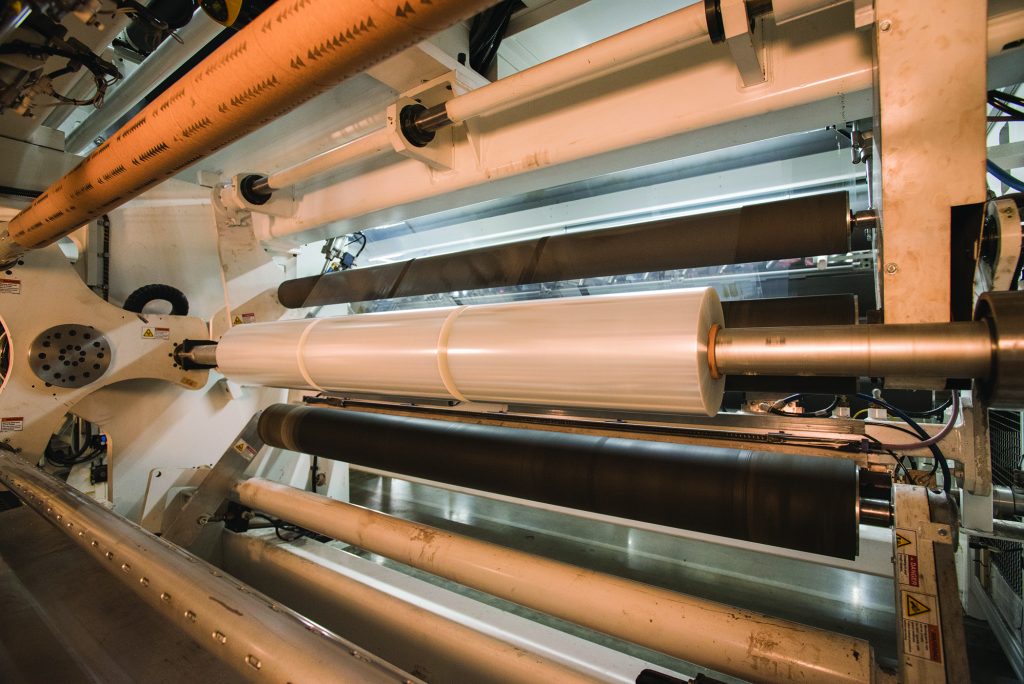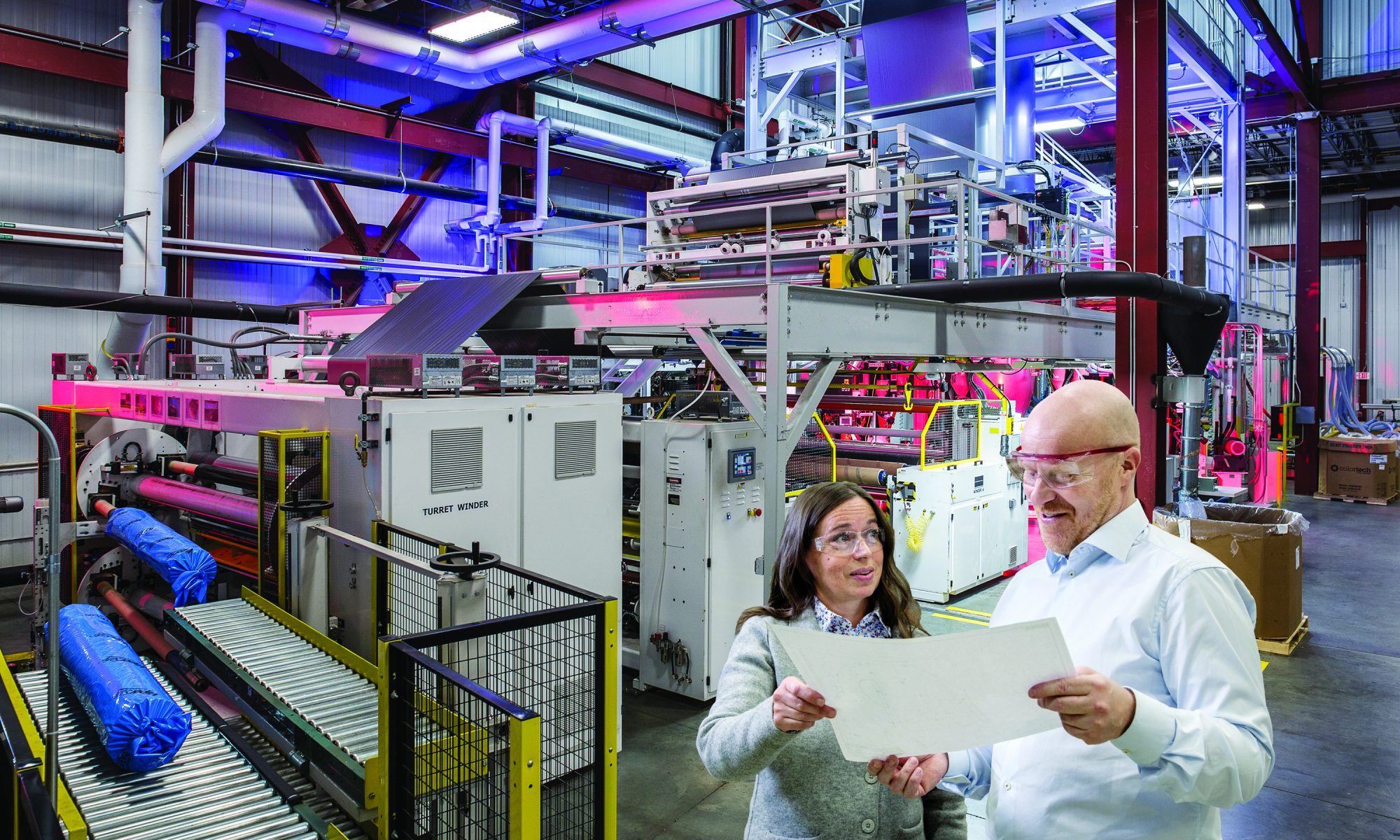 Davis-Standard’s technology and support services will be promoted at Plasticos Brazil, Hall D, booth 142 in Sao Paulo, Brazil, March 25-29, 2019. Davis-Standard will highlight key equipment capabilities for extrusion coating, blown film, cast film, sheet extrusion and thermoforming, all engineered to support a range of applications on every continent. Davis-Standard will also have information on aftermarket and technical services focused on delivering cost-efficiency, reduced downtime and improved operation. This includes equipment upgrades, replacement parts, global field services, custom engineering, research and technical services, and a 24/7 customer service hotline. Following is a summary of key technologies in Davis-Standard’s product portfolio. The company’s extrusion coating product line is a comprehensive equipment offering from a single-source supplier to address basic applications all the way up to high-speed, complex requirements. Systems are engineered for everything from high-quality flexible packaging, thermal lamination and stand-up pouches, to lidding, tube, and aseptic films. Specifications can be customized based on market requirements and investment plans.
Davis-Standard’s technology and support services will be promoted at Plasticos Brazil, Hall D, booth 142 in Sao Paulo, Brazil, March 25-29, 2019. Davis-Standard will highlight key equipment capabilities for extrusion coating, blown film, cast film, sheet extrusion and thermoforming, all engineered to support a range of applications on every continent. Davis-Standard will also have information on aftermarket and technical services focused on delivering cost-efficiency, reduced downtime and improved operation. This includes equipment upgrades, replacement parts, global field services, custom engineering, research and technical services, and a 24/7 customer service hotline. Following is a summary of key technologies in Davis-Standard’s product portfolio. The company’s extrusion coating product line is a comprehensive equipment offering from a single-source supplier to address basic applications all the way up to high-speed, complex requirements. Systems are engineered for everything from high-quality flexible packaging, thermal lamination and stand-up pouches, to lidding, tube, and aseptic films. Specifications can be customized based on market requirements and investment plans.
An example of this is Davis-Standard’s dsX flex-pack™ system. This machine provides converters and package printers with a high-value, competitively-priced package. An adaptable machine configuration gives processors the flexibility to compete in a variety of emerging application markets including salted snack and noodle bags, toothpaste tubes, personal care products, condiment packs and stand-up pouches. Production benefits include product consistency, excellent bonding strength, greater uptime and productivity, and reduced waste and production costs. The economic benefit of these 300 mpm (1,000 fpm) machines is enabling many regional converters to distinguish themselves from the competition.
In cast film, Davis-Standard offers a stretch film line that redefines modular efficiency for high-grade film operations. This technology is the new standard for stretch film line configurations. Advantages include a compact machine arrangement, ease of operation and servicing, excellent profile control, consistent roll quality and an intuitive control package. The system is engineered for producing thin films from 7.8µ to 13µ (31-to 51-gauge) at high speeds.
Davis-Standard’s side-by-side DS S3 overlapping winder is essential to this capability. The DS S3 winder enables maximum slit widths for hand-wrap, machine-wrap and jumbo rolls. All rolls are discharged on the downstream end of the winder and are conveyed to a common side of the line to simplify roll packing and future automation. Cores are also same-side loaded from the back to prevent disruption of packing activities. There is an auxiliary lay-on roll to eliminate top-wind waste during transfer, optimizing roll quality and eliminating outer wrap transfer waste. High-volume core bins minimize refilling frequency and feature a simultaneous core-set discharge of multiple core lengths to decrease cycle times, improve slit-width flexibility and net film utilization. Core widths can also be changed on the fly to maximize uptime. There is a 30-second cycle time regardless of the number of slit widths, ideal for hand-wrap products.
Specific to CPP films, Davis-Standard offers the horizontal ironing roll winder. This winder has an adjustable ironing roll which allows the converter to control the amount of air introduced into the winding roll, eliminating “tin canning,” a common issue when running CPP.
In blown film, Davis-Standard supplies extrusion systems for applications in high-barrier food packaging, agricultural films, geomembrane, stretch film, printing and laminating films, flexible packaging, collation shrink films and stretch hooders. For films that require superb clarity and flexibility, Davis-Standard offers the Aquafrost® water-quench system. Other options include industry-leading Vector® air rings, DSB® feedscrew designs, and Streamlined Coextrusion Die (SCD®), Optiflow and Vertex dies, each optimally designed to process specific films.
Davis-Standard also supplies downstream and terminal equipment as well as MDO’s, oscillating haul-offs, and winders to optimize web handling and output goals. These solutions can accommodate standard applications as well as complex substrates and structures requiring precise tension control to ensure quality while minimizing waste. Automation options are available to reduce cycle time and augment benefits from increased outputs.
In sheet extrusion, Davis-Standard supplies complete systems or components to support the packaging and industrial sectors. One recent development is the DS-Helibar® extruder. This extruder is the next generation in Davis-Standard’s groove feed extruder offering. With the Helibar design, helical grooves inside the barrel run along the entire barrel bore. This technology has shown to increase extruder output rates while improving energy efficiency and reducing barrel and screw wear. Other advantages include lower start-up costs, shorter residence time and the ability to process higher levels of regrind. This is especially beneficial for high-profile applications where speed, melt quality and efficiency are paramount.
As a complement to its sheet extrusion technology, Davis-Standard recently acquired Thermoforming Systems LLC (“TSL”) of Union Gap, Washington. TSL (www.tslusa.biz) designs, manufactures and markets thermoforming equipment to the food packaging industry.
For more information prior to Plasticos Brazil, visit www.davis-standard.com.
Photo Caption: S3 Winder with auxiliary lay-on roller.

